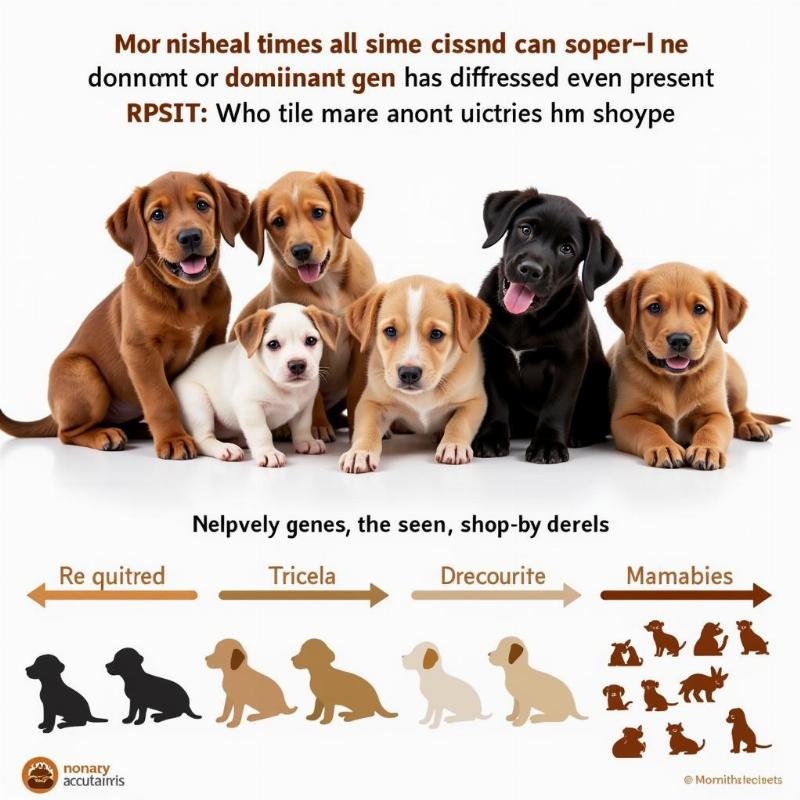The age-old question of whether dad dog genes are stronger than mom’s is a common one among dog owners. It’s natural to wonder which parent contributes more to a puppy’s appearance, temperament, and overall health. While simple answers like “dad’s genes are dominant” are tempting, the reality is far more nuanced and fascinating. The truth is, both parents contribute equally to their offspring’s genetic makeup, and it’s the complex interplay of these genes that determines the puppy’s characteristics. This article will delve into the science of canine genetics, debunking myths and providing accurate information to help you understand the fascinating world of dog heredity.
Understanding Canine Genetics: It’s a Mix and Match!
Think of it like this: each puppy receives a shuffled deck of cards, with half the cards coming from mom and the other half from dad. Some cards (genes) are stronger than others, and some combinations create unique traits. While some traits might appear to be more influenced by one parent, this is often due to the complex interactions of multiple genes, rather than one parent’s genes being inherently “stronger.” This inheritance pattern holds true for everything from coat color and size to potential health predispositions. So, while you might see more of dad’s physical characteristics in one puppy, another puppy in the same litter could favor mom’s side.
Debunking the “Stronger Genes” Myth
The idea of one parent having “stronger” genes is a misconception. Both parents contribute an equal amount of genetic material. The expression of these genes, however, can vary. Some genes are dominant, meaning they overpower recessive genes. This explains why certain traits seem to skip a generation or appear unexpectedly. For example, if dad carries a dominant gene for a specific coat color and mom carries a recessive gene for a different color, the puppies are more likely to express dad’s coat color. This doesn’t mean dad’s genes are stronger; it simply means the dominant gene is expressed, while the recessive gene is hidden, potentially appearing in future generations.
 Dominant and Recessive Genes in Dogs
Dominant and Recessive Genes in Dogs
Predicting Traits: More Than Just Mom and Dad
While parentage plays a significant role, predicting a puppy’s traits is not always straightforward. Environmental factors, like nutrition and socialization, also influence a dog’s development. Furthermore, the genetic diversity within dog breeds adds another layer of complexity. For instance, a mixed breed puppy’s appearance can be especially difficult to predict due to the varied genetic background of its parents.
How Breed Standards Come into Play
The American Kennel Club (AKC) establishes breed standards, which describe the ideal appearance, temperament, and structure of each recognized breed. Breeders use these standards as guidelines when selecting breeding pairs, aiming to produce puppies that conform to the breed standard. However, even within a breed, genetic variation exists, leading to differences among individual dogs.
Conclusion
So, are dad dog genes stronger? No. Both parents contribute equally to a puppy’s genetic makeup. The expression of these genes is a complex interplay of dominant and recessive alleles, influenced by multiple factors, including environment and breed characteristics. Understanding this intricate process helps appreciate the unique individuality of each dog.
FAQ
- Does the father dog determine the puppy’s sex? Yes, the father’s sperm carries either an X or a Y chromosome, which determines the puppy’s sex. The mother always contributes an X chromosome.
- Can I predict my puppy’s temperament based on the parents? Temperament is influenced by both genetics and environment. While parental temperament can offer some clues, it’s not a guaranteed predictor.
- Do mixed breed dogs have more health problems than purebreds? Not necessarily. Mixed breeds can sometimes benefit from “hybrid vigor,” reducing the likelihood of inheriting breed-specific health issues.
- What are some common genetic disorders in dogs? Hip dysplasia, progressive retinal atrophy, and certain heart conditions are examples of genetic disorders that can affect dogs.
- How can I learn more about my dog’s genetic background? DNA testing kits can provide insights into your dog’s breed ancestry and potential health risks.
- Do all puppies in a litter inherit the same genes? No, each puppy receives a unique combination of genes from both parents, resulting in individual variations within a litter.
- What is the role of epigenetics in dog inheritance? Epigenetics refers to changes in gene expression that don’t involve alterations to the underlying DNA sequence. These changes can be influenced by environmental factors and can be passed down through generations.
Beautdogs.us, your premier resource for all things dog-related in the US, provides expert advice on dog breeds, care, and products. Whether you’re a seasoned dog owner or just starting your journey, Beautdogs.us is here to support you. We offer a wealth of information, from breed-specific guides to expert veterinary advice, helping you provide the best possible care for your furry companion. Connect with us today for personalized support: Email: [email protected], Phone: +1 501-555-7529. Visit Beautdogs.us for more information.